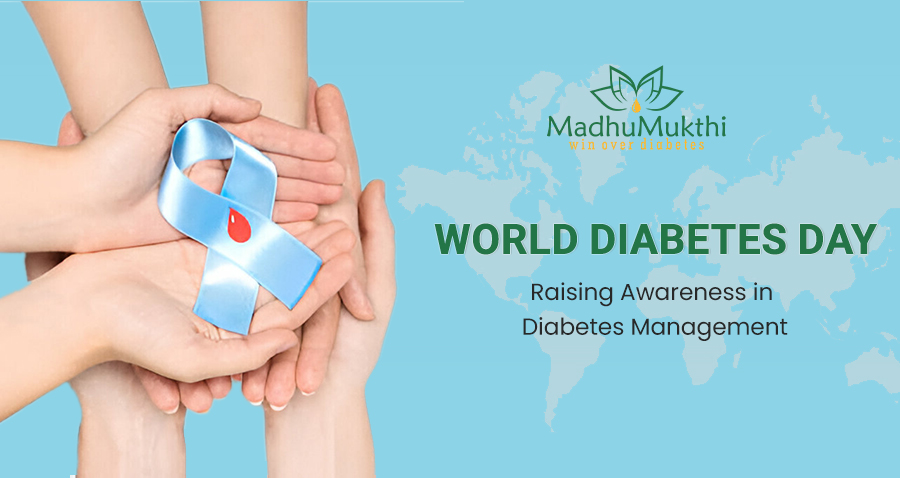
World Diabetes Day: Raising Awareness in Diabetes Management

World Diabetes Day (WDD) is celebrated on November 14 to increase awareness about diabetes and its impact on people’s lives. It is also a day to advocate for better prevention, diagnosis, and management of diabetes.
The theme for World Diabetes Day 2023 is “Access to Diabetes Care.” This theme highlights the importance that everyone with diabetes has access to the quality care they need to manage their condition and live healthy lives.
Raising awareness about diabetes is important for improving the management of this disease.
By raising awareness, we can help people to:
- Understand the risk factors for diabetes and take some preventive steps
- Recognize the symptoms of diabetes and get an early diagnosis
- Manage the diabetes effectively to avoid complications
- We should speak up for better diabetes care and more comprehensive support services.
Guidelines for Diabetes Management
Managing diabetes can be challenging, but evidence-based guidelines can provide helpful recommendations for those with the condition. Expert healthcare professionals develop these guidelines and update them regularly based on the latest research findings. By following these guidelines, individuals with diabetes can live healthy and fulfilling lives. The important factors of diabetes management include:
- Blood glucose control: This includes monitoring blood glucose levels regularly and adjusting medications to maintain blood glucose levels within target ranges.
- Healthy eating: Eating a healthy diet can help people control sugar levels, manage their weight, and reduce the risk of complications.
- Physical activity: Regular physical exercise will help to improve blood sugar control, reduce weight, and improve overall health.
- Medication: Some people with diabetes may need to take medicines to control their glucose levels and manage other aspects.
Importance of diabetes care in maintaining overall health:
Diabetes is a chronic disease that can affect many things in a person’s health. People with diabetes need to manage their condition to reduce the risk of complications, such as heart attack, kidney disease, blindness, and nerve damage.
Exploring the role of continuous glucose monitoring
Continuous glucose monitoring is a technology that helps people with diabetes to continuously track their blood glucose levels throughout the day. This tool can be extremely useful for diabetes management, as it provides real-time data about sugar levels, which can help individuals identify their situation and make necessary changes to their lifestyle.
Foot Care in Diabetes
Foot problems are a common complication of diabetes, caused by nerve and blood vessel damage in the feet. These problems can include foot infections and amputations. Therefore, it is essential for people with diabetes to take good care of their feet. Proper foot care can help prevent these complications, reduce the risk of foot problems, and maintain mobility and independence.
There are several things that people with diabetes can do to take care of their feet, including:
- Checking their feet for cuts and sores daily
- Washing feet with lukewarm water
- Drying their feet completely
- Maintaining well-moisturized feet.
- Cultivate the habit of wearing shoes.
- Avoid walking barefoot
People with diabetes should see a healthcare professional for regular foot check-ups. These check-ups will help to identify complications and improve the chances of a full recovery.
Diabetic Retinopathy and Eye Care
Diabetic retinopathy is a condition that affects the blood vessels in the retina. Diabetic retinopathy leads to reduced clarity of vision, vision loss, and even complete blindness
The early stages of diabetic retinopathy often do not cause any symptoms. However, as the disease progresses, people with diabetes may experience the following symptoms:
- Blurred vision
- Flashing lights in the eyes
- Dark spots in the vision
- Loss of peripheral vision
- Pain in the eyes
If you have diabetes and notice symptoms like vision changes, consult a doctor immediately. Regular eye check-ups are crucial for detecting diabetic retinopathy early when treatment is most effective. Early intervention can prevent vision loss and blindness.
Diabetic Neuropathy and its management
Diabetic neuropathy is a complication of diabetes that affects the nerves. Diabetic neuropathy can cause a variety of symptoms, including numbness, tingling, pain, weakness, and difficulty with balance and coordination.
Holistic Diabetes Care
Holistic diabetes care is a way to manage diabetes that considers all aspects of a person’s health, including physical, mental, emotional, and spiritual health. Holistic diabetes care aims to help people with diabetes live healthier and more fulfilling lives.
There are several ways to integrate holistic health care into diabetes management, including:
- Following a healthy diet and lifestyle
- Managing stress
- Practicing mindfulness
- Connecting with a supportive community
Ways to reverse prediabetes and promote healthier living
Prediabetes is a condition in which blood sugar levels are higher than normal but not high enough to be diagnosed as diabetes. Prediabetes can be reversed with changes in way of living, such as:
- Eating a healthy food
- Regularly Exercising
- Weight loss
- Quitting tobacco
Natural Remedies & Ayurvedic Medicine for diabetes care
Ayurvedic medicine has been used for centuries to treat various health conditions. It is an effective option for those looking to manage diabetes and reduce the likelihood of complications. Some of the natural remedies include:
- Natural Herbs like turmeric, ginger, and cinnamon
- Food plan changes
- Yoga and meditation
Benefits of a healthy lifestyle in diabetes care
A healthy lifestyle is essential for people with diabetes to manage their condition and reduce their risk of complications. A healthy lifestyle includes having a healthy diet and exercising regularly. Maintaining a healthy weight is important for people with diabetes to reduce complications such as heart disease, stroke, and kidney disease.
Enhancing Diabetes Awareness
Role of awareness in effective diabetes management
Awareness is essential for effective diabetes management. People with diabetes need to know their condition, the risks associated with it, and the strategies for managing it. Increased awareness also aids individuals in recognizing signs and symptoms of diabetes complications, prompting early diagnosis and treatment.
Spreading awareness through community engagement
There are several ways to spread awareness about diabetes in the community. Some of these include:
- Organizing community events, such as diabetes walks and screenings
- Speaking in social groups about diabetes
- Providing learning materials about diabetes
- Working with business persons to promote healthy diet and physical activity
Preventing diabetes is achievable through promoting healthy living within the community, thus lowering the risk of individuals developing the disease.
Conclusion
Diabetes is a chronic condition that can significantly impact a person’s overall health. To decrease the risk of complications, it is important to manage diabetes. Fortunately, there are several strategies that people with diabetes can use to manage their condition and lead healthier lives. Raising awareness about diabetes is paramount to improving the prevention, diagnosis, and management of this disease. We all should play a role in increasing awareness about diabetes to promote healthier lifestyles. Here are a few things we can do:
- Talk to your close friends and family about diabetes.
- Learn about diabetes and the risks associated with it.
- Support diabetes awareness initiatives in your community.
- Make healthy lifestyle choices in your own life.
Diabetes is a complicated disease that requires a coordinated effort to manage effectively. By working together, we can create a world where people with diabetes can live long, and healthy.




